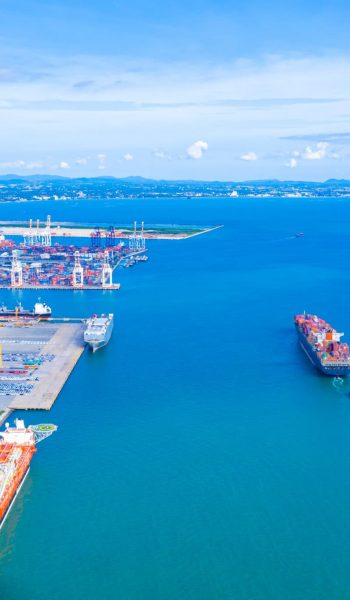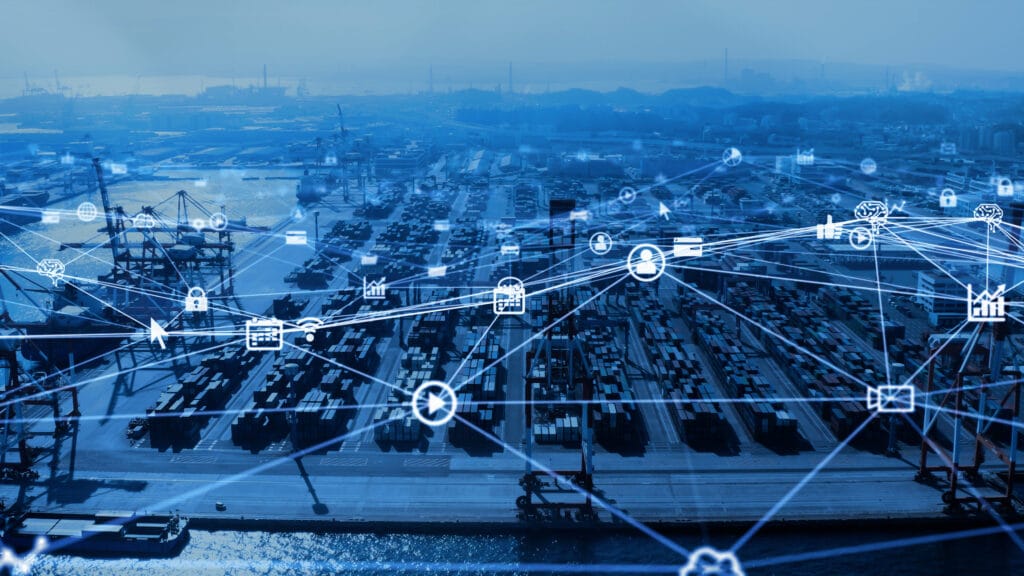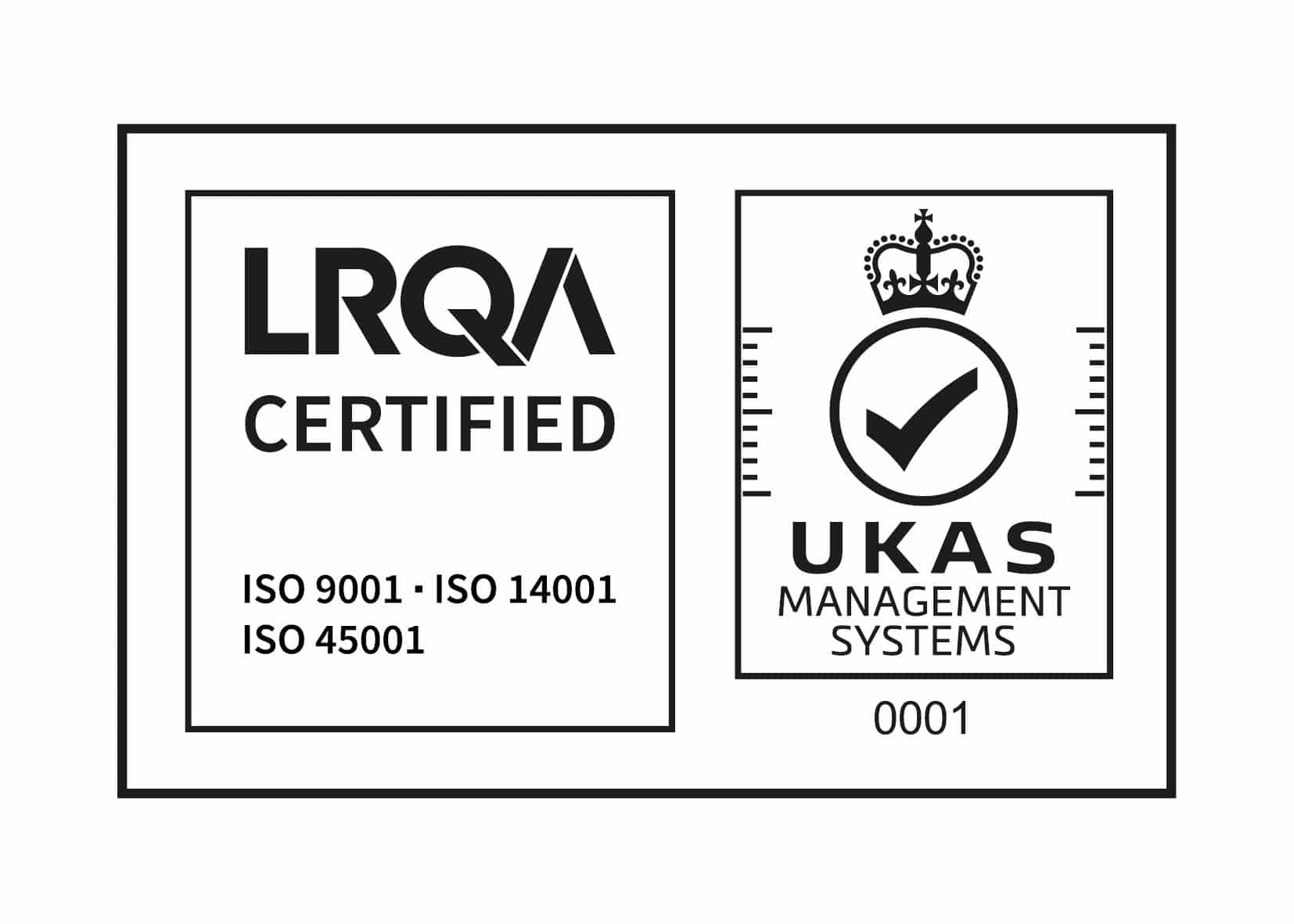What Is a Smart Port?
A Smart Port is digital. “Smart” means being more attractive and innovative with more intelligence in a competitive sense.
Ports link vessels and goods with importers and exporters. They are a major node in global supply chain operations of the maritime industry and trade. Ports have now become entire communities and ecosystems.
A Smart Port is a more effective, more performant, and more economically competitive port. Not only that, but Smart Ports consider residents a key stakeholder of their activities and operations. They use real–time information, a collaborative management approach, provide more security, save energy, and essentially provide more with less.
Smart Ports are green, digital, and more connected to logistics, industrial environments, and sustainable development resources. They are automated ports using new technologies while caring more for the marine environment.
Smart Ports encompass Big Data, Artificial Intelligence (AI), Internet of Things (IoT), blockchain technology, and 5G connection.
Predict the ETA of any vessel for free!
Get an accurate prediction of the ETA of any vessel thanks to our ETA Calculator Module. It’s easy, in real-time and free. You just have to sign-up to our HUB.

Why Do Smart Ports Matter?
In today’s maritime world, ships are increasing in size, the population is growing, ports are crowding, and with a globalized economy, goods need to move faster. In less than 10 years, vessels are projected to sail autonomously, and so becoming smart is no longer just an option, but necessary to remain competitive in the shipping market and at capacity. Technology development is fundamental to improve surrounding cities. Competition between ports is more and more important, so making business practices and operations smarter means making them more attractive.
The maritime industry, once seen as resistant to change, will soon adopt technology of great power that is the way of the digitalized future.
Ports must be knowledgeable about the market, players, and stakeholders in their industry and must have a competitive strategy, or they will not remain competitive as the international supply chain and maritime sector changes.
Ports are also responsible for the safety and security of employees and affected stakeholders. Specifically, the Port Harbor Master Division must oversee – collision prevention, protected environmental areas, environmental pollution prevention, and worker safety. The technology used by Smart Ports can help the Port Harbor Master Division to better prevent safety issues and improve predictive analysis.
What Drives the Switch to a Smart Port?
Due to globalization, increasing shipping traffic will affect ports everywhere. Other industries are digitalizing, and ports will also need to digitalize to continue transport operations. The world is growing, more goods and services are being shipped, and there is more international trade. There are more environmental issues, and there is more congestion.
Smart Ports reduce congestion thus reducing pollution. Smart Ports adopt automation, which better connects ports to stakeholders using automated ships or vehicles. Input leads to higher efficiency in system operations, saving time and money.
Smart Ports use intelligent systems, are transparent and sustainable, have an open innovation mindset, and encompass Big Data, Artificial Intelligence, blockchain, non-stop service, efficiency, automation, and greentech.
What Are Smart Port Technologies?

Big Data
Big Data is a game-changer technology for the shipping industry. The world is becoming data-driven, and ports are no longer an exception. This is more than just large amounts of inputs. It allows companies to use enormous amounts of data from non-traditional sources. A non-traditional source is time-sensitive inputs, not just past recorded, used to optimize the industry and ports.
Large sets of data exist, and now the questions is: what can be done with it? Big Data contributes to predictive technology and estimated time of arrival (ETA) systems that will change the maritime shipping industry. For example, sensors are now attached to vessels that give real-time information. Big Data systems use this information to track vessels and cargo, including texts, audios, videos, and real-time information.
Precise inputs leads ports to peak efficiency, performance, and growth.
Artificial Intelligence (AI)
Artificial Intelligence, and more specifically machine learning, is when machines are programmed to replicate and imitate human decision-making and monitoring processes. Artificial Intelligence improves business operations and efficiency. It can be used as a decision-making system for accurate port operation predictions. Artificial Intelligence uses Big Data to predict what will happen in the future global supply chain system.
Artificial Intelligence also creates a safer working environment, reducing driver mistakes and accidents, and helping with overall work safety security.
Internet of Things (IoT)
Internet of Things (IoT) is a system of “things” embedded with different types of technologies, like sensors. IoT can, for example, identify in detail what each ship is carrying. IoT allows port authorities to track arriving vessels in real-time and keep track of cargo. IoT enables decision–making based on precise input exchange.
Blockchain Technology
Blockchain technology stores data. With blockchain technology, logistics companies can follow each event that occurs in the global supply chain. These inputs stored forever and cannot be deleted. Blockchain technology allows all data to be stored online which could reinvent the shipping sector’s decision–making processes. For actors would have access to unchangeable real-time data.
This technology provides an open platform paperwork–free system.
5G
5G is a network with faster transition speeds that can handle 1000 times more traffic than 4G. 5G is crucial to Smart Ports in their transition to an intelligent system. 5G enables ports to use more data with lower power consumption, to transfer data in real–time, and to use the information they receive from IoT systems quickly and efficiently.
Further, in a port, there are many metal surfaces. Before 5G, the different signals could get lost in a port. However, with 5G there is a beamforming technology that enables wireless signals to be sent in a specific direction without being interrupted.
Big Data, Artificial Intelligence, Internet of Things, blockchain technology, and a 5G network are all key pillars for Smart Ports.
How Does a Port Become Smart?
To become a Smart Port, ports must adapt a strategy to become digitalized. Thanks to companies like Sinay, this is becoming easier. For example, at Sinay we offer ports the Sinay Hub, a 360-degree view of all maritime activities that could be affecting their ports. Smart Ports also strategize to include residents, inhabitants, and the port community in their decision making. For example, Smart Ports often consider the real estate offered around their port, the business they could welcome, and the appearance of the port, on top of the economic benefits.

What Are Smart Port Examples?
The Port of Rotterdam and the Port of Quebec are two great examples of ports that are adopting Smart Port technologies and systems.
The Port of Rotterdam
The Port of Rotterdam believes they started the biggest digitalized project ever for a port. This port is one of the longest ports, 40 km (25 miles) long. The port realized that in the future fossil fuels will disappear and within 8 years vessels will fully use automation. Even port containers (the container that goods are shipped in) are being digitalized. They, therefore, created what is known as the Digital Twin (DT). The DT of the Port of Rotterdam mimics the port, but digitally. In this way, the port can see ahead of time how their activities will affect the port, the surrounding ecosystem, and the shipping industry. This port has created, through adopting a Smart Port system, economic and social values with partners through sustainable growth.
Port of Rotterdam uses the technologies listed above to predict what ports will be like even 80 years from now. Data allows them to make accurate predictions and projections to remain competitive and efficient in a soon-to-be digitalized maritime industry.
Port of Quebec
The Port of Quebec is an example of a Smart Port that is putting its region, citizens, and residents at the heart of their Smart Port initiatives. They have dedicated 20 percent of their territory to tourism and recreational activities. Port of Quebec is also involved in a green project initiative to plant 4,500 trees by 2022 between the port and surrounding community. They collaborate to host events, and are also involved in circular economy and technological projects.
Predict the ETA of any vessel for free!
Get an accurate prediction of the ETA of any vessel thanks to our ETA Calculator Module. It’s easy, in real-time and free. You just have to sign-up to our HUB.

What Happens in a Smart Port City?
A Smart Port city recognizes the growing tension of ports versus their hinterlands. These lands include residential and industrial areas. There is pressure from hinterlands to make ports more attractive, as ports have environmental impacts on the land and sea. However, there is also pressure on ports coming from the expanding hinterlands. Therefore, a Smart Port city reintroduces the relationship between ports and their hinterlands and how they can symbiotically work together.
A Smart Port city is also about fluidity. The entire value chain (the business activities creating value for customers) is fluid and competitive. For example, Port of Havre (HAROPA) in France put in place a software system that enables the port to unload a ship’s good within just a few minutes. This mean the ship pulls up, the goods are unloaded, and the ship leaves. This reduces congestion, saves money, and helps the environment.
A Smart Port city is also a circular economy. This is the idea that there is no waste. Ports are diverse business zones, and so there is a new concept that the waste of one industry is beneficial and can be used by another industry. Port Québec, Port Le Havre, and Port of Rotterdam have started to put a circular economy in place.
Smart Port cities also introduce the concept of a port as an energy hub. This is the idea ports can transition from being very energy-consuming to becoming very self-sufficient using green energy. There is a possibility that ports could even become green energy providers for surrounding hinterlands.
Smart Ports recognize that they are part of an entire ecosystem, and so they adopt technologies to help their business and reduce the impact on the environment.
It requires a certain intelligence and technology know-how, along with an inclusion of port communities and inhabitants, to be a Smart Port city. Smart Ports not only become digitalized, but they reinclude the residents to their port infrastructure.
Why Must Ports Go Digital?
Joyce Bliek, Director of Digital Business Solutions for Port of Rotterdam, says ports who fail to go smart will be left behind. That is where the industry is going.
The maritime and shipping industry are lagging industries in terms of digitalization, so impacts for logistics companies and ports could be huge if we take for example of how digitalization has changed other industries.
Bliek explains that as ports are a node in a supply chain, and that if they want authority, they must be nodes in both the physical and digitalized supply chains. Next to any physical port, should be a Digital Twin. For example, one part of any quay wall built today at Port of Rotterdam has a physical twin that allows predictive maintenance and berthing that is physically inaccessible.
Being a Smart Port saves money regarding dredging, maintenance, patrol boats, and helps the efficiency of the port.
Already there exist online booking sites for large ships, and for port authorities to welcome these ships they must adopt online platforms.
Smart Ports are the way of the future. They are more efficient, and more accommodating for the digitalized era. They encompass not only digitalization, but an idea of reintegrating residents, the community, and concern for the environment back into the port ecosystem.
Watch Joyce Bliek speak about the importance of Smart Ports below.
Frequently Asked Questions About: SMART PORTS
Smart Ports are ports equipped with technology and intelligent solutions that enhance operations, security, infrastructure, and management.
A Smart Port uses technology to enhance their operations and solutions.
Currently, Port of Rotterdam is considered the smartest port in the world.
- Rotterdam
- Hamburg
- Antwerp
- Singapore
- Shanghai
- Le Havre HAROPA
- Los Angeles
- Copenhagen Malmö Port
- Valencia
- Barcelona





